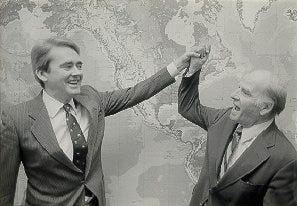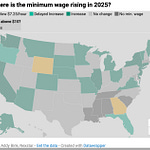
In some ways, NEPA [the National Environmental Policy Act, January 1, 1970] may turn out to be the most influential of our environmental laws for it not only sets forth our basic national goals for environmental protection, but it also tells us that essential to achieving them is foresight.
From the Council on Environmental Quality’s introduction to its tenth annual report, 1980.
NEPA has turned out to be an incredibly significant law because it laid out our Country’s vision for how we want to live on the planet, and that vision suddenly included the environment. NEPA requires that all federal agencies fully consider the “environmental impact” of every new project it undertakes that is likely to have a significant impact on the environment, including highways, airports, buildings and similar projects, and spawned the dreaded, voluminous Environmental Impact Statements (EIS) that everyone loves to read.
It also provides the legal basis to create the U.S. Environmental Protection Agency, and corresponding state EPA’s, plus a stack of environmental statutes and regulations passed between 1970 and 1980 alone.
Most of our businesses in the U.S., of all sizes, bemoan environmental regulations because it cuts into their profit margins to comply. But if our Country had not taken action when it did, or even at all, we would be living in one continuous stream of pollution, otherwise known as a garbage dump.
The 52nd Earth Day is over, and it’s a good time to reflect on Earth Days past and present. I remember the first Earth Day because I was already interested in the environment and vaguely knew what was going on with all the marches and demands for action. I also remember Earth Day 1990 because my mother died early that morning. I was working as a staff attorney for the Ohio EPA at the time and was scheduled to volunteer at a local Earth Day event. I showed up and spent most of the day at that celebration—better to have the opportunity to think about something more important than my personal loss.
Earth Day was born after at least two decades of watching our country pay the price of unchecked pollution, with massive oil spills, burning rivers and thick, smelly clouds of pollution billowing from factories around the country. As I wrote recently on Crime and Punishment, Rachel Carson had a major impact on the burgeoning environmental movement after the release of her book, Silent Spring, and her testimony before Congress. Her meticulous, scientific research remains potent even today. Members of Congress and the public were shocked at the time, but years would pass before any laws were enacted to rein in the use of pesticides. Ironically, 60 years after the publication of Silent Spring, both the class action and individual lawsuits against Monsanto and Bayer for the widespread cancer caused by its pesticide, Round-Up, are still not fully settled.
But the real significance of the first Earth Day and NEPA is captured in the quote from the Environmental Council’s report mentioned above—that the way to achieve the broad, environmental goals laid out in this law is with “foresight”. The foresight to realize that our collective actions today will impact our collective future. Fifty-two years later, our planet is on the brink of a climate apocalypse. We have acted with some foresight, but what is our next step?
Enjoy these few minutes with a real journalist, Walter Cronkite, as he reports on our first Earth Day, April 22, 1970.
Let me know your thoughts on Earth Day and its history. And I’d love to hear how you celebrated Earth Day 2022.
And if you are not already a free or paid subscriber, your support is welcome!
A Few Additional Readings About Earth Day
— From the EPA Archives on the 10th Anniversary of Earth Day, written by its founder, Senator Gaylord Nelson
https://archive.epa.gov/epa/aboutepa/earth-day-70-what-it-meant.html
— The History of Earth Day by earthday.org
https://www.earthday.org/history/
— A 2019 Smithsonian Magazine article on the 1969 Cuyahoga River fire.
—An Earth Day 2022 NY Times article about the 1969 Santa Barbara oil spill .
https://www.nytimes.com/2022/04/22/us/earth-day-1969-oil-spill.html














Share this post